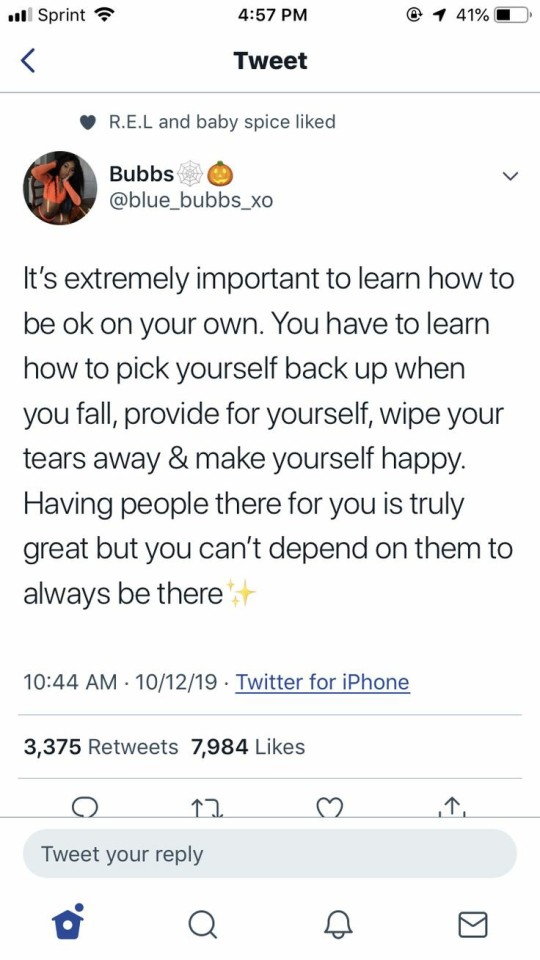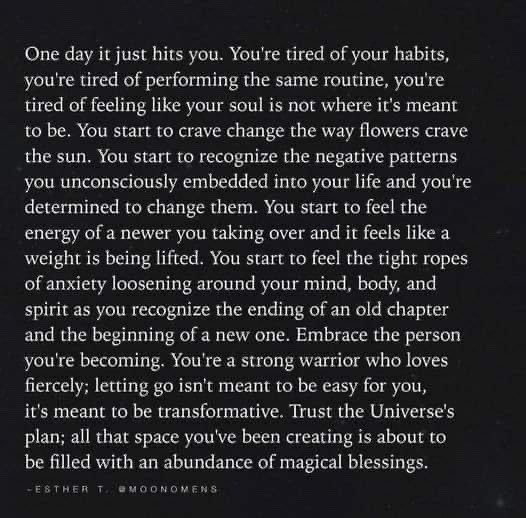#personal improvement
Text
Green Flags in Communication 💚💬
"I want to know when I hurt your feelings."
This shows they are willing to understand and acknowledge the impact of their actions.
"I don't want you to feel alone in this."
This shows empathy and indicates that the person is supportive and does not want the person to deal with issues alone.
"I've been struggling with ___”
This demonstrates vulnerability and trust, as the person is open about their struggles.
"How have you been feeling about ___? I know it's been on your mind a lot."
This shows concern for the other person's issues or worries, showing that they are listening and care about what's important to the other person.
"I feel __ when you __; are you open to trying __ next time?"
This is an example of constructive communication.
"What do you need from me when this happens with your family?"
This shows awareness and sensitivity to the persons family dynamics and a willingness to provide support.
"I appreciate when you ___.”
Expressing appreciation is vital for positive reinforcement and acknowledging the efforts and qualities of the other person.
"I didn't handle that well."
This is a sign of self-awareness and accountability, recognizing one's own mistakes and being open to learning and growth.
"I'm sorry, I was wrong to say that. I'll try to be more mindful in the future."
Shows you are able to apologize genuinely and a commitment to improving behavior.
"Tell me more about that; I'm really interested in hearing your perspective."
Indicates a genuine interest in the other person's thoughts and feelings.
"I noticed you seemed a bit off today. Is everything okay?"
It shows you are attentive to the other person's emotional state and a readiness to provide support.
"I'm here for you, no matter what you need."
Offers unconditional support, creating a sense of security in the relationship.
"I love how passionate you are about your hobbies. It's inspiring to see."
Expresses admiration for the other person's interests.
"Let's work on a solution together. What do you think would be fair?"
Focusing on collaboration rather than conflict.
"I trust your judgment on this."
Trust and respect for the other person's decision-making abilities.
"Your happiness is important to me. Let's make sure you're taking time for yourself."
Prioritizes the other person's happiness and emphasizes the importance of self care.
"It's okay to feel that way. Do you want to talk about it more?"
Validates the other person's feelings.
"I appreciate how you handled that situation. You're really good at ___."
Praises specific strengths or skills, boosting the other person's self-esteem.
"I know we disagree, but I respect your point of view."
Acknowledges differences in opinion while still maintaining respect and understanding.
#communication#personal improvement#personal growth#personal development#self help#self awareness#self reflection#self improvement#healthy relationships#relationship advice#relationships#green flags#emotional intelligence#healthy relationship#health and wellness#mental wellness#mental health#level up journey#glow up tips#glow up#positive mindset#growth mindset
4K notes
·
View notes
Text
Stop letting other people tell you who you are.
#personal improvement#personal growth#personal development#successquotes#successtips#self love#self care#hypergamy#svdaily#wealthy lifestyle#text post#black tumblr#healing#recovery#soft life#soft black women#black femininity#soft girl
4K notes
·
View notes
Text

#people pleaser#personal improvement#self worth#self help#self improvement#mental health#self reflection#be yourself#new life#letting go#inspirational quotes#new beginnings#positivity#let it go#moving forward#moving on#seeking validation#people pleasing#loving life#being present#being yourself#be happy#positive thoughts#manifestation#inspiring
2K notes
·
View notes
Text

"The Seven Spiritual Laws of Success" presents seven principles for achieving success and fulfillment in life. The book draws upon ancient spiritual traditions, including Hinduism and Buddhism, to offer practical advice for achieving success and happiness.
The seven spiritual laws of success presented in the book are:
The Law of Pure Potentiality: This law emphasizes the importance of connecting with the infinite source of potential within oneself.
The Law of Giving: This law teaches that giving and receiving are different expressions of the same energy and that giving is a key to abundance and happiness.
The Law of Karma or Cause and Effect: This law teaches that every action has a consequence and encourages individuals to be mindful of their thoughts and actions.
The Law of Least Effort: This law emphasizes the importance of living in a state of effortlessness and flow, by aligning with the natural rhythms of life.
The Law of Intention and Desire: This law teaches that intention and desire are powerful forces that can manifest one's desires into reality.
The Law of Detachment: This law emphasizes the importance of letting go of attachment to outcomes and being open to the infinite possibilities of the universe.
The Law of Dharma or Purpose in Life: This law teaches that each individual has a unique purpose in life and encourages individuals to align their actions with their true purpose.
#deepak chopra#mindset#successsecrets#personal improvement#personal development#bookish#new books#booktok#bookstagram#best seller books#book recommendations#book review
3K notes
·
View notes
Text

✨ this mindset ✨
#self improvement#positive thoughts#healing journey#positivity#self healing#self love#self care#positive mindset#positive thinking#positive quotes#positive vibes#always remember#never forget#pinterest girl#becoming that girl#that girl#dream girl#dream life#personal improvement#life improvement#it girl#im just a girl#mindset#mental health#recovery#do it for yourself#keep going#don’t give up#mental growth
370 notes
·
View notes
Text

#self education#self care#self love#self development#self improvement#personal improvement#personal growth#success#boss quotes#girl boss aesthetic#high value woman#high value mindset#entreprenuership
371 notes
·
View notes
Text

#self improvement#improve your life#personal improvement#inner growth#growth mindset#that girl#it girl#high value woman#leveled up mindset#dream girl journey#self love journey
154 notes
·
View notes
Text
Go Back on This When You’re Trying to Improve Your Life
Ask Yourself These Questions:
what am I focused on improving?
why did I decide to focus on this area of my life?
how badly do I want to improve this part of myself?
am I willing to be consistent with this change?
Journal all of these questions out. Answer with full sentences and make sure you’re fully understanding your desire to change. Form a routine from these questions and follow it consistently for three months minimum.
Things You Can Improve On
Language. Are you planning on traveling or understanding the language of the people around you?
Behavior. Are you wanting to be seen in a different light? Do you think you display an awkwardness you don’t necessarily like? Are you finding yourself in a more feminine or masculine energy? Is that what you want?
Body. Are you comfortable with your temple? The skin that holds you all together? The organs that form your curves? Do you want to change anything?
Education. Are you curious about anything? Have you been reading up on it? Do you know dates, times, recipes, etc?
Dress. Are you representing who you are, the way that you want to be displayed? Do you like the way you dress? What can you do to feel more like yourself? Do you like to feel put-together?
Communication. Do you have trouble talking to others and setting boundaries? How often do you talk about yourself in conversations? How often do you let others talk about themselves? How often do you reciprocate actions?
Health. Are you eating correctly? Do you feel energized or bloated after eating? How often do you eat fresh greens? How can you keep a healthy gut?
#self improvement#self development#personal improvement#life improvement#100 days of productivity#nutrition
206 notes
·
View notes
Text
Overcoming your fears is part of the process of growth. You can't grow without letting go.
#inspirational quotes#inspiring quotes#quotes#quotations#spiritual quotes#spiritual growth#spiritual healing#spiritual enlightenment#spiritual development#spiritual awakening#spiritual life#manifestation#law of manifestation#personal growth#personal thoughts#personal improvement#personal development#spiritualgrowth#how to manifest#self improvement#manifestingmiracles#positivity#spirituality#personal healing#healing quotes#self healing#healing
140 notes
·
View notes
Text

#self love#self care#healingjourney#self healing#loveyourself#self compassion#love#i am worthy#worth it#confidence#self improvement#personal improvement#meditate#note to self#self conscious#educate yourself#education#know your worth#knowledge#have fuuuun
478 notes
·
View notes
Text

#coquette#girlblogging#fashion#girl blogger#girl blog aesthetic#lana del ray aesthetic#beauty#just girly thoughts#self love#self ship#self care#self improvement#positivity#affrimations#manifesting#manifesation#quotes#aura#advice#personal improvement#mental health#confident#confidence#girl interrupted#i’m just a girl#this is what makes us girls#good vibes#law of the universe#phsychology#energy
45 notes
·
View notes
Text
How To Become A Brand New Person ✨✨
Self Reflect:
Journal daily.
Think about past decisions and how they impacted your life.
Meditate regularly.
Create a vision board to visualize your goals.
Review your strengths and weaknesses.
Identify your core values and beliefs.
Figure out your passions and interests.
Think about your childhood dreams and aspirations.
Evaluate your current state of happiness and fulfillment.
Set Clear Goals:
Define specific career goals, like "Get promoted within two years."
Set health goals, like "Lose 20 pounds in six months."
Create financial goals such as "Save $10,000 for a vacation."
Establish personal development goals, like "Read 24 books in a year."
Set relationship goals, such as "Improve communication with my partner."
Define education goals, like "Complete a master's degree in three years."
Set travel goals, like "Visit five new countries in the next two years."
Create hobbies and interests goals, such as "Learn to play a musical instrument."
Set community or volunteer goals, like "Volunteer 100 hours this year."
Establish mindfulness or self-care goals, such as "Practice meditation daily."
Self Care:
Exercise for at least 30 minutes a day.
Follow a balanced diet with plenty of fruits and vegetables.
Prioritize getting 7-9 hours of quality sleep each night.
Practice in relaxation techniques like deep breathing or yoga.
Take regular breaks at work to avoid burnout.
Schedule "me time" for activities you enjoy.
Limit exposure to stressors and toxic people.
Practice regular skincare and grooming routines.
Seek regular medical check-ups and screenings.
Stay hydrated by drinking enough water daily.
Personal Development:
Read a book every month from various genres.
Attend workshops or seminars on topics of interest.
Learn a new language or musical instrument.
Take online courses to acquire new skills.
Set aside time for daily reflection and self improvement.
Seek a mentor in your field for guidance.
Attend conferences and networking events.
Start a side project or hobby to expand your abilities.
Practice public speaking or communication skills.
Do creative activities like painting, writing, or photography.
Create a Support System:
Build a close knit group of friends who uplift and inspire you.
Join clubs or organizations aligned with your interests.
Connect with a mentor or life coach.
Attend family gatherings to maintain bonds.
Be open and honest in your communication with loved ones.
Seek advice from trusted colleagues or supervisors.
Attend support groups for specific challenges (e.g., addiction recovery).
Cultivate online connections through social media.
Find a therapist or counselor for emotional support.
Participate in community or volunteer activities to meet like minded people.
Change Habits:
Cut back on sugary or processed foods.
Reduce screen time and increase physical activity.
Practice gratitude by keeping a daily journal.
Manage stress through mindfulness meditation.
Limit procrastination by setting specific deadlines.
Reduce negative self-talk by practicing self-compassion.
Establish a regular exercise routine.
Create a budget and stick to it.
Develop a morning and evening routine for consistency.
Overcome Fear and Self Doubt:
Face a specific fear head-on (example: public speaking).
Challenge your negative thoughts with positive affirmations.
Seek therapy to address underlying fears or traumas.
Take small, calculated risks to build confidence.
Visualize success in challenging situations.
Surround yourself with supportive and encouraging people.
Journal about your fears and doubts to gain clarity.
Celebrate your accomplishments, no matter how small.
Focus on your strengths and accomplishments.
Embrace failure as a valuable learning experience.
Embrace Change:
Relocate to a new city or country.
Switch careers or industries to pursue your passion.
Take on leadership roles in your workplace.
Volunteer for projects outside your comfort zone.
Embrace new technologies and digital tools.
Travel to unfamiliar destinations.
Start a new hobby or creative endeavor.
Change your daily routine to add variety.
Adjust your mindset to see change as an opportunity.
Seek out diverse perspectives and viewpoints.
Practice Gratitude:
Write down three things you're grateful for each day.
Express gratitude to loved ones regularly.
Create a gratitude jar and add notes of appreciation.
Reflect on the positive aspects of challenging situations.
Show gratitude by volunteering or helping others in need.
Send thank-you notes or messages to people who've helped you.
Keep a gratitude journal and review it regularly.
Share your gratitude openly during family meals or gatherings.
Focus on the present moment and appreciate the little things.
Practice gratitude even in times of adversity.
Be Patient:
Set realistic expectations for your progress.
Accept that personal growth takes time.
Focus on the journey rather than the destination.
Learn from setbacks and view them as opportunities to improve.
Celebrate small milestones along the way.
Practice self-compassion during challenging times.
Stay committed to your goals, even when progress is slow.
Keep a journal to track your personal growth.
Recognize that patience is a valuable skill in personal transformation.
Celebrate Small Wins:
Treat yourself to your favorite meal or dessert.
Reward yourself with a spa day or self-care activity.
Share your achievements with friends and loved ones.
Create a vision board to visualize your successes.
Acknowledge and congratulate yourself in a journal.
Give yourself permission to take a break and relax.
Display reminders of your accomplishments in your workspace.
Take a day off to celebrate a major milestone.
Host a small gathering to mark your achievements.
Set aside time to reflect on how far you've come.
Maintain Balance:
Set clear boundaries in your personal and work life.
Prioritize self care activities in your daily routine.
Schedule regular breaks and downtime.
Learn to say "no" when necessary to avoid overcommitment.
Evaluate your work life balance regularly.
Seek support from friends and family to avoid burnout.
Be kind to yourself and accept imperfections.
Practice mindfulness to stay present and grounded.
Revisit your priorities and adjust them as needed.
Embrace self love and self acceptance as part of your daily life.
#personal improvement#personal development#personal growth#self help#self awareness#self reflection#self improvement#level up journey#self love journey#dream girl guide#dream girl journey#dream girl tips#becoming that girl#that girl#it girl#glow up tips#glow up#clean girl#pink pilates girl#divine feminine#femininity#femme fatale#feminine journey
6K notes
·
View notes
Text
Do it for you. Your success is yours even when nobody's clapping.
#svdaily#inspiration#success motivation#successquotes#personal growth#personal improvement#luxury lifestyle#black luxury#black tumblr#black girls winning#business motivation#business mindset
4K notes
·
View notes
Text

#personal improvement#inner peace#peace#saying no will give me peace#self worth#self help#leave the past behind#self therapy#therapy#life lessons#self reflection#self improvement#self love#being present#being yourself#be happy#new beginnings#positive thoughts#positivity#loving life#love yourself#living unapologetically#living for myself#new day#new me#new life#you got to let it go#let it go#moving forward#move on
579 notes
·
View notes
Text
101 Essays that will change the way you think, a personal development book by Brianna Wiest is a compilation of short essays that discuss why you should pursue purpose over passion, embrace negative thinking, see the wisdom in daily routine & become aware of the cognitive biases that are creating the way you see your life.




#brianna wiest#personal improvement#personal development#booksofig#best seller books#new books#bookstagram#books and reading#bookshelf#book review#bookaddict#bookpromotion#bookish#booknerd#nonfiction#non fiction#booktiktok#booktok#101 essays that will change the way you think
851 notes
·
View notes
Text

⋆⭒˚。⋆ tips to help you sleep earlier 🌙
(I’m trying to fix my sleep schedule lol)
❥ firstly, try to get 8-10 hours of sleep every night!
❥ stretch for 10 minutes before going to sleep ~ this helps relax your body
❥ meditate for 5- 10 minutes before sleeping ~ helps calm your mind
❥ if you struggle with racing thoughts and anxiety before sleeping keep a journal ~ write about your day and your worries every night before going to sleep
❥ try to limit screen time before going to sleep, instead read or colour ~ great ways to occupy your mind, help you feel more relaxed and ready to sleep
❥ something I often ask myself is “what am I staying awake for?” If I have no studying to do, I’m not talking to a friend or spending time with family, then why not go to sleep? Why should I stay up on my phone until late at night which will only make me feel bad the next day ~ this helps remind me that I don’t need to go on my phone or watch a tv show and I can just go to sleep whenever I want to and feel better the next day
❥ consistency. ~ fixing a sleep schedule takes time and can be difficult to do but if you stay consistent and keep trying you’ll get it!
#that girl#personal growth#personal improvement#self improvement#self love#glow up#self care#self healing#sleeping beauty#i need sleep
56 notes
·
View notes